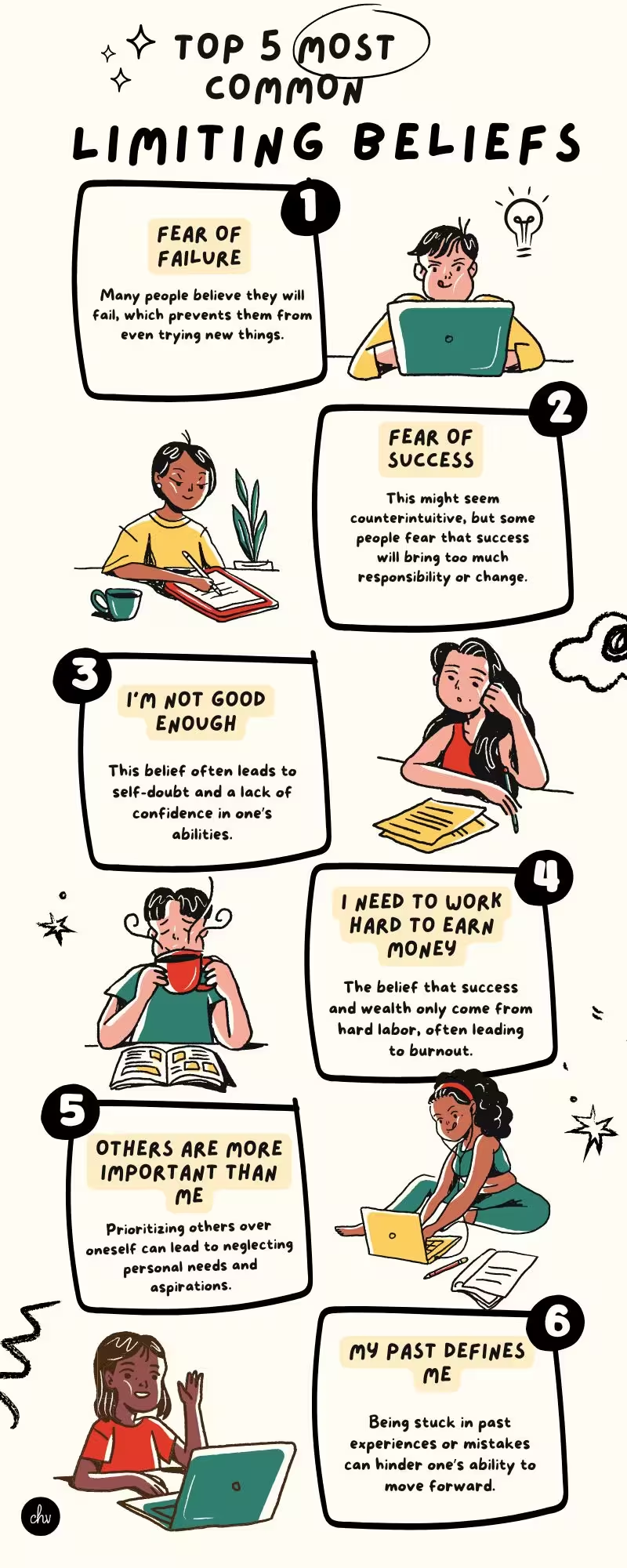Overcome Limiting Beliefs: Learn 9 Epic Ways To Self-Mastery

A limiting belief is a self-imposed mindset that you accept as an absolute truth, which creates an obstacle in your life and prevents you from pursuing certain actions or goals.
These beliefs aren’t limited to how you view yourself; they can also shape your perceptions of the world, relationships, and possibilities.
Believing “I’m not good enough” can hold you back from opportunities, even if this belief is unfounded. Limited beliefs can be deeply ingrained, making it difficult to recognize them for what they truly are: barriers that limit your potential.
What Are Limiting Beliefs
Limiting beliefs are mental blocks you accept as truth, even when they hold you back.
They often come from early childhood conditioning, social expectations, or past criticism that shaped how you see yourself.
Beliefs like “hard work brings results” drive progress.
But limiting beliefs do the opposite; they feed doubt, fear, and low self-worth.
You’ve probably heard or thought these before:
These thoughts feel true, but that doesn’t make them facts.
You can challenge them.
You can rewrite them.
You can swap them out for beliefs that nurture your growth instead of hindering it.

Overcoming Limiting Beliefs
1. Identify and Challenge Your Limiting Beliefs
The first step to overcoming limiting beliefs is to identify them. Write these thoughts down in a journal to separate them from reality. Often, these beliefs present themselves as negative self-talk. By identifying them, you can begin to see how unfounded and untrue they are.
2. Use Positive Affirmations
One of the most effective ways to combat limiting beliefs is through positive affirmations. For example, if you often think, “I’m not good at public speaking,” replace it with, “I am confident in my ability to communicate effectively.” Repeating these affirmations daily helps rewire your mind and reinforces a positive self-image.
3. Reframe Negative Thoughts
Whenever you catch yourself thinking negatively, pause and reframe those thoughts into positive statements. Ask yourself for evidence that supports or contradicts your beliefs. This practice helps challenge the negative narratives that may be holding you back.
Understanding the Origin of Limiting Beliefs
Limiting beliefs often originate from negative experiences or repetitive negative thoughts. Recognizing the source of these beliefs, whether from childhood conditioning, past failures, or unhealthy relationships, is crucial for change.
Recognizing the source of these thoughts helps you tackle them directly.
Arnold Schwarzenegger, the legendary bodybuilder and actor, is a prime example of breaking free from limiting beliefs. Despite critics doubting his accent and physique, Arnold believed in his potential and persevered. His unwavering belief in himself led him to become a seven-time Mr. Olympia and a Hollywood icon. His story highlights the importance of a strong mindset and belief in one’s abilities.
Arnold Schwarzenegger’s Journey

How to Identify Your Limiting Beliefs
Identifying your limiting beliefs is a crucial step toward unlocking your full potential. These beliefs often operate in the background, quietly shaping your actions and thoughts, which is why they can be tricky to spot.
With the right approach, you can identify and address them.
1. Reflect on Your Behavior
One of the most effective ways to uncover your limiting beliefs is to look at your actions and reactions. Think about situations where you felt held back or avoided something.
For instance, if you frequently avoid speaking up in meetings, it might stem from a belief that your ideas aren’t valuable. By reflecting on these patterns, you can start to identify the underlying beliefs that are influencing your behavior.
2. Ask Yourself Probing Questions
Sometimes, the best way to identify your limiting beliefs is to ask yourself direct questions. Start with a goal you haven’t achieved yet and ask yourself why you think that is.
Asking yourself questions like, “What do I believe about my abilities?” or “What fears arise when I think about this goal?” can help you identify the beliefs that might be holding you back.
Being honest with yourself is key during this process, as the initial answers that come to mind are often the most insightful.
Discover Your Inner Self. Join Our Self-Mastery Program.
Self-Mastery Coaching gives you the space, tools, and guidance to grow, reflect and discover your values and inner strength.

3. Write Down Your Thoughts and Beliefs
Journaling can be a powerful tool for identifying limiting beliefs. Start by writing down any beliefs you hold strongly, whether they’re about yourself, others, or the world.
Don’t censor yourself, let the thoughts flow. Once you’ve got them on paper, look for patterns. Are there recurring themes of self-doubt, fear, or negativity? These could be your limiting beliefs.
4. Consider Your Self-Talk
Pay attention to the way you talk to yourself, especially in challenging situations. If you catch yourself thinking, “I can’t do this,” or “I’m not good enough,” you’re likely dealing with a limiting belief.
Try to trace these thoughts back to their source. Where did this belief come from? Was it something you learned as a child, or did it develop from a specific experience?
5. Challenge Your Beliefs
Once you’ve identified a potential limiting belief, don’t accept it at face value. Ask yourself, “Is this true?” For example, if you believe you’re too old to start a new career, ask yourself if there’s evidence to support that belief. Often, you’ll find that these beliefs are based on assumptions or fears, rather than facts.

Top 9 Ways to Self-Mastery
1. Open Your Mind to the Possibilities of Abundance
Be open to new ideas and seek out every opportunity. Embrace new experiences and say yes to possibilities, even if they seem daunting. When you’re open-minded, you allow yourself to break free from limited patterns and expand your horizons.
2. Eliminate Negative Influences from Your Life
Surround yourself with positive, supportive people who uplift you. Negative influences can drag you down and reinforce limiting beliefs. By distancing yourself from negativity, you create space for growth and positivity.
3. Write Down Your Goals
Writing your goals down is a powerful way to stay motivated and focused. Place them somewhere visible, like on your mirror or desk, to remind yourself daily of what you’re working towards. This visual reminder keeps you aligned with your aspirations.
4. Practice Positive Thinking Daily
Positive thinking is crucial for overcoming limiting beliefs. Replace negative thoughts with positive ones, and focus on the good in your life. This shift in mindset can lead to a more optimistic outlook and open up new possibilities.
Subscribe to Create Higher Vibrations!
Get Inspiration and Practical advice straight to your inbox.
5. Talk About Your Goals with Others
Sharing your goals with others creates accountability. When you discuss your goals with someone, they become more real, and you’re more likely to follow through. Seek support from friends, mentors, or colleagues who can encourage you on your journey.
6. Let Go of Negative Thought Processes
Release negative thoughts that hold you back. It may be challenging, but it’s essential to replace them with empowering beliefs. The more you practice letting go, the more natural it will become.
7. Practice Gratitude
Gratitude shifts your focus from what’s lacking to what you already have. Be thankful for the small things in life, and recognize the abundance around you. This practice can lead to a more positive mindset and help you overcome limiting beliefs.
8. Embrace Failure as a Learning Opportunity
Instead of fearing failure, embrace it as a chance to learn and grow. Failure is an inevitable part of success, and each setback brings valuable lessons. By viewing failure as a stepping stone, you can continue moving forward despite obstacles.
9. Take Action
Action is the key to overcoming limiting beliefs. Don’t just think about your goals, act on them. Each step you take, no matter how small, brings you closer to achieving your dreams. Consistent action builds momentum and gradually dissolves limiting beliefs.

In The End…
It’s time to take control of your life by mastering your limiting beliefs. Start today by identifying the thoughts that can hold you back and replace them with empowering beliefs.
Take action, embrace the journey, and watch as you transform your life. Remember, the only limits that exist are the ones you place on yourself.


